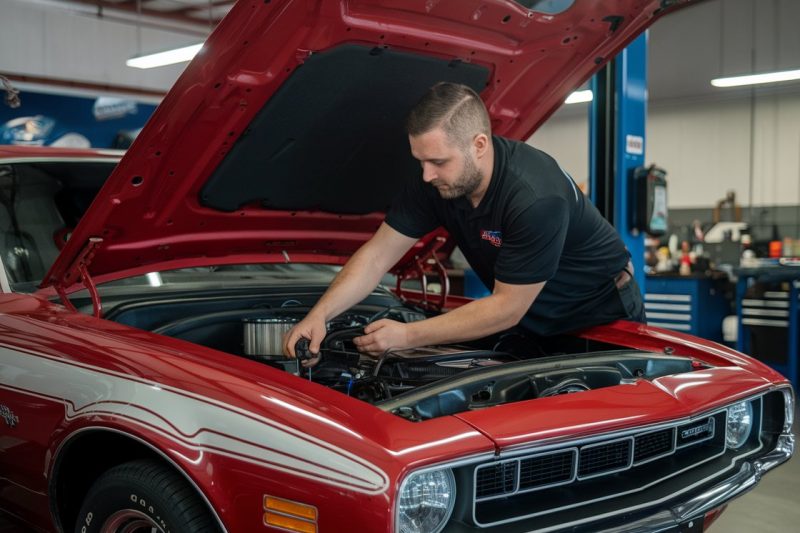Keeping your car in peak condition all year round ensures it runs smoothly and remains reliable. Routine maintenance can prevent many common issues that arise from neglect. With a bit of effort, you can enhance your vehicle’s performance and lifespan.
Understanding the specific needs of your car during different seasons is also crucial. Whether it’s the scorching heat of summer or the freezing temperatures of winter, each season presents unique challenges for vehicle maintenance. Addressing these challenges head-on can save you time, money, and hassle in the long run.
Preventative measures are your best friend when it comes to maintaining your car. Simple actions can make a big difference in keeping major repairs at bay. And sometimes, knowing when to seek professional assistance is the key to avoiding severe damage. Following these top tips will help keep your car in excellent condition and ensure safe and enjoyable driving experiences.
Routine Maintenance You Can Do Yourself
Table of Contents
- 1 Routine Maintenance You Can Do Yourself
- 2 Understanding Seasonal Maintenance Needs
- 3 Preventative Measures for Longevity
- 4 When to Seek Professional Services
- 5 Final Thoughts
- 6 What are the key tips to keep your car in peak condition?
- 7 How often should I perform car maintenance?
- 8 What should I check when inspecting my car?
Ensuring your car stays in top shape starts with simple maintenance tasks you can handle yourself. Regularly checking and changing the engine oil is one of the most important tasks. Fresh oil lubricates the engine’s moving parts, reduces friction, and helps prevent overheating. Check your oil level monthly and change it as recommended by your vehicle’s manufacturer, usually every 5,000 to 7,500 miles.
Inspecting and replacing the air filter is another easy task. A clean air filter allows your engine to breathe properly, promoting better fuel efficiency and performance. Depending on driving conditions, it’s wise to check the air filter every 12,000 to 15,000 miles and replace it if it looks dirty.
Checking tire pressure monthly is also crucial. Properly inflated tires ensure safe handling, improve fuel economy, and extend tire life. Use a tire pressure gauge to check the pressure and add air if needed, making sure it matches the recommended level in your car’s manual.
These routine checks and replacements help maintain your car’s overall health, preventing major issues and keeping it running smoothly year-round. Consistent upkeep can extend the life of your vehicle and save you money on repairs.
Understanding Seasonal Maintenance Needs
Winter car care is essential for ensuring your vehicle handles cold temperatures and icy conditions. Start by checking the antifreeze levels to prevent the engine from freezing. Make sure the antifreeze mixture is suitable for your area’s winter conditions. Inspect your battery as well, since cold weather can reduce its performance. Clean any corrosion from the terminals and ensure the battery is fully charged.
Tires are particularly important in winter. Consider switching to winter tires for better traction on snow and ice. If you stick with all-season tires, check the tread depth and replace them if the tread is worn down. Keeping your windshield washer fluid full and using a winter formula that won’t freeze is also crucial. Check wiper blades for wear and replace them if they are worn out.
In summer, car care focuses on keeping the engine cool and maintaining tire health in the heat. Make sure your air conditioning system works properly by checking the refrigerant levels and servicing the system if needed. Inspect your coolant level and top it off if necessary, ensuring the radiator and hoses are in good condition.
Hot weather can affect tire pressure, so check it frequently and adjust as needed. Examine the tires for any signs of wear or damage. Keeping your car’s interior cool can also prevent damage to the dashboard and upholstery. Use sunshades and park in the shade whenever possible.
By adapting your maintenance routine to the season, you help keep your car performing well and avoid seasonal problems that could lead to costly repairs.
Preventative Measures for Longevity
To keep your car running smoothly for years to come, adopting a few preventative measures is crucial. One of the most important actions is regular oil changes. Fresh oil lubricates engine components, reducing friction and preventing overheating. A clean oil filter also helps to keep debris out of the engine, ensuring smooth operation.
Regularly inspect and maintain the brakes. This includes checking the brake pads, rotors, and fluid levels. Replacing worn brake pads in a timely manner can prevent further damage to the brake system and ensure your safety on the road.
Another key preventive measure is maintaining consistent tire care. Regularly rotate your tires to promote even wear, which extends their life. Check the alignment and balance to ensure a smooth ride and prevent uneven tire wear.
Keeping your vehicle clean inside and out can also be beneficial. Washing and waxing the exterior helps protect the paint from the elements, while vacuuming and cleaning the interior can prevent wear and tear on the upholstery and carpets.
These preventive actions are important because they help identify potential issues before they become serious problems. Regular maintenance not only ensures your car performs at its best but also saves you money in the long run by avoiding costly repairs.
When to Seek Professional Services
Knowing when to seek professional help is essential for maintaining your car’s health. One of the clear signs that your car needs professional attention is the illumination of the check engine light. This warning can signal a variety of issues, from a loose gas cap to more serious engine problems. If the light comes on and stays on, make an appointment with a mechanic as soon as possible.
Unusual sounds such as grinding, squealing, or knocking can also be indicators that your vehicle needs professional diagnostics. These noises can stem from various issues, including problems with the brakes, suspension, or engine. Addressing these sounds quickly can prevent further damage and ensure your car remains safe to drive.
Vibrations or pulling to one side while driving are another sign you may need professional help. These symptoms can be caused by alignment issues, tire imbalances, or problems with the suspension system. An experienced mechanic can diagnose and fix these problems to restore your car’s smooth handling.
Regular professional inspections are beneficial because they often identify issues that might not be evident during daily maintenance. Mechanics have the tools and expertise to perform thorough checks, ensuring every part of your vehicle is in good working order. Routine inspections contribute to your car’s reliability and longevity, giving you peace of mind every time you hit the road.
Final Thoughts
Keeping your car in peak condition all year round involves a combination of regular DIY maintenance, seasonal adjustments, and knowing when to seek professional assistance. By following these top tips, you can ensure your car remains reliable, efficient, and safe to drive. Understanding the specific needs of your vehicle, from routine oil changes to seasonal maintenance, helps prevent common issues and extend your car’s lifespan.
Preventative measures play a crucial role in maintaining your vehicle. Simple tasks such as checking tire pressure, replacing air filters, and inspecting the brakes can significantly impact your car’s performance and longevity. However, recognizing when it’s time to bring in the professionals is equally important. Mechanics have the knowledge and tools to address complex issues, ensuring your car receives the care it needs.
If your vehicle requires a thorough inspection or if you’re facing persistent issues, trust My Mechanic Joe in Woodstock, GA. We’re here to provide top-quality auto repair, diagnostics, and car maintenance services. Contact us today to schedule an appointment and keep your car in top-notch condition.
What are the key tips to keep your car in peak condition?
To keep your car in peak condition, it’s essential to follow a combination of car maintenance tips that include regular checks on important systems. Here are some fundamental tips: 1. Regular oil changes to ensure optimal engine performance. 2. Checking and maintaining tire pressure for safety and fuel efficiency. 3. Inspecting brake components, including brake pads and brake fluid. 4. Monitoring coolant levels to prevent overheating. 5. Keeping an eye on the condition of your air filter. 6. Regularly washing your car to protect the paint and body. 7. Checking the wiper blades for visibility in adverse conditions. 8. Following a maintenance schedule for all essential services. 9. Inspecting the dashboard for warning lights. 10. Keeping the engine clean to ensure longevity. This holistic approach will help you keep your vehicle running smoothly throughout the year.
How often should I perform car maintenance?
Regular maintenance is crucial for keeping your car in good shape. It is recommended to perform basic checks every month and more thorough inspections every 3,000 to 5,000 miles or as advised in your vehicle’s manual. This includes checking oil change intervals, tire pressure, fluid levels, and making sure your brake system is functioning correctly. Following a maintenance schedule tailored to your specific vehicle will help in preventing major issues.
What should I check when inspecting my car?
When you inspect your car, focus on several key areas: 1. **Fluids**: Check levels of engine oil, transmission fluid, brake fluid, and coolant. 2. **Brakes**: Look at brake pads for wear and ensure brake fluid is at the proper level. 3. **Tires**: Check tread depth.

